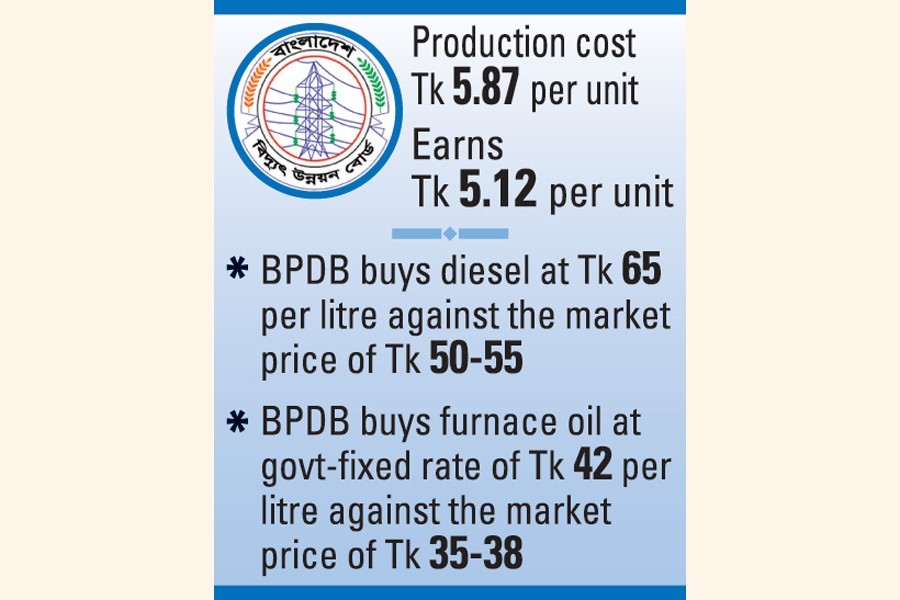The local overall electricity generation costs have fallen amid a downtrend in global oil prices with the spread of the Covid-19 pandemic across countries.
"The falling oil prices have reduced electricity generation costs slightly," said Bangladesh Power Development Board (BPDB) chairman Md Belayet Hossain.
He, however, said the decline in power generation cost did not reach any point to cut the overall power tariff.
"We're still counting Tk 0.70 per unit (1.0 kilowatt hour) loss as we're selling at Tk 5.12 per unit against the production cost of Tk 5.87 per-unit," he told the FE.
Had the government allowed the BPDB to purchase diesel and furnace oil at international rates, sources said, the overall generation costs would have been lower.
The BPDB now buys diesel at the government-fixed rate of Tk 65 per litre from Bangladesh Petroleum Corporation to generate electricity at diesel-fired power plants owned by both public and private sectors.
But the international market price of diesel is hovering at an estimated Tk 50-55 per litre, said a source familiar with the international trading of oil products.
Similarly, the BPDB has also been purchasing furnace oil at the government-fixed rate of Tk 42 per litre.
But the international market price of furnace oil is currently hovering around Tk 35-38 per litre, the official cited.
Global diesel and furnace oil prices were as low as Tk 40 and 20 per litre respectively when oil prices fell significantly due to the emergence of coronavirus months ago, said sources.
The price of Brent crude, the benchmark in international oil price, hovered around $38 per barrel on Monday, which was around $70 per barrel in January.
The Brent crude price fell below $20 per barrel in April due to the Covid-19 pandemic.
But the energy regulator hiked the latest power tariff predicting that the Brent crude oil price would hit $55 per barrel, said a senior official of Bangladesh Energy Regulatory Commission.
According to officials, oil-fired plants have an aggregated generation capacity of 6,840 megawatts (MW), both in private and public sectors in the country.
Of the total plants, nearly 5,700MW-capacity plants are furnace oil-fireds. Of them, around 1,200MW power is owned by the government and the remaining 4,500MW by privately-owned plants.
The government resolved to install a number of oil-fired rental- and quick-rental power plants in the private sector from 2009 as a 'short-term' solution to a nagging countrywide electricity crisis then.
It later allowed more oil-fired plants under independent power producers with the tenure of up to 15 years.
Most of these plants were awarded on the basis of unsolicited offers under the Speedy Supply of Power and Energy (Special Provision) Act 2010.
The law has a provision of immunity to those involved with the quick-fix remedies.
The entrepreneurs were also allowed to go for duty-free import of furnace oil to run their plants with 9.0-per cent service charge along with import costs as an incentive, said a senior power division official.
As consequences, power tariffs for retail consumers had been raised on nine occasions with the latest effective from March 01, 2020.
When contacted, Consumers' Association of Bangladesh energy adviser Prof M Shamsul Alam demanded a reduction in tariffs for all sorts of energy like electricity, natural gas, petroleum products and coal to fight the current pandemic.
He sought withdrawal of capacity payment provisions for oil-fired power plants to reduce the overall power production costs.
Mr Alam also demanded shutdown of all power plants aged more than 20 years to ensure efficiency.
He stressed the need for avoiding 'unnecessary' costs to fight the pandemic.


